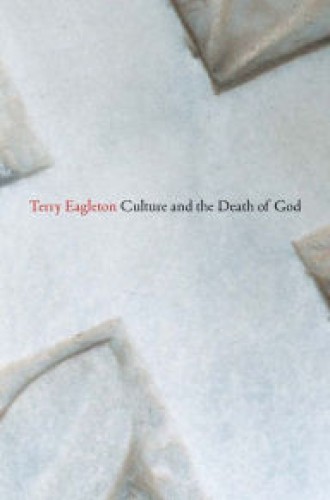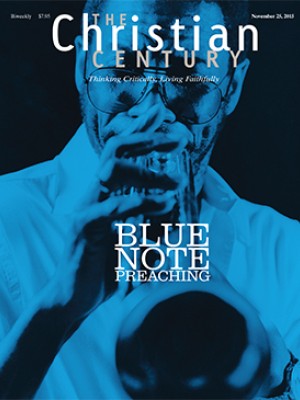Culture and the Death of God, by Terry Eagleton
In Terry Eagleton’s compelling narrative, three plotlines run concurrently. First is a parade of ideas from the Enlightenment to the present, displaying an awesome command of philosophy and literature while offering an absorbing study that highlights key figures and traces significant trends. Second is a sustained argument about the definition, influence, and extent of culture and about its role as a substitute for religion in the modern era; this a thoughtful, deft, and rich story, expertly told. Finally, there’s a burlesque apologetic for Christianity, which dodges the bullets of its demise by diving between the rocks of its inadequate replacements; here the polemic is suffused with irony and sardonic wit.
This effervescent trinity of story lines makes for a feast of erudition, insight, and fun. You must read Culture and the Death of God slowly, as much to check that you haven’t missed any references, inferences, or jokes as to underline the quotable lines so you can later pass yourself off as one who possesses a fraction of Eagleton’s scholarship and wit.
Read our latest issue or browse back issues.
Atheism, it turns out, is not as easy as it looks. The story goes like this. The Enlightenment sought “to oust a barbarous, benighted faith in favour of a rational, civilised one.” It tore into religion, but it did so as a child berates a parent: it resented the power of the church, particularly in the political sphere, but it never imagined being without religion, and it had few ideas about how society was to be conceived or controlled if religion were truly to leave the scene.
A parade of thinkers who had no personal time for Christianity balked at the prospect of the general population living without it, which would be like removing a dam from a reservoir. This has been an abiding quandary for intellectuals ever since. Eagleton ridicules the quandary, calling it “unpleasantly disingenuous”: “‘I don’t happen to believe myself, but it is politically expedient that you should’ is the catchphrase of thinkers supposedly devoted to the integrity of the intellect,” he observes sarcastically. He points out that the most cursory glance at the Gospels would yield the conclusion that Jesus “proclaims that he has come to pitch society into turmoil.”
Meanwhile, the more rigorously rational the world becomes, the more arbitrary and unfathomable God becomes. Everything in society is rendered explicable, but there is no longer any system for making actions legitimate or valid. Such pathos continues into the industrial era. Individualism is a divisive doctrine, inhospitable to corporate identity. Capitalism proves incapable of generating an organic ideology of its own, so it reverts to one imported from elsewhere, often an idealized bygone era; it requires values such as faith, truth, and hierarchical order but has no way of manufacturing them.
And so to the project the book narrates and exposes: filling God’s shoes with reason, art, culture, imagination, the nation, humanity, the state, the people, society, morality, “or some other such specious surrogate.” God is not quite dead—mortally sick, perhaps, but capably delegating responsibility “to one envoy or another, part of whose task is to convince men and women that there is no cause for alarm, that business will be conducted as usual despite the absence of the proprietor, and that the acting director is perfectly capable of handling all inquiries.”
The bathetic anticlimax to this narrative is postmodernism, for which Eagleton saves his most withering prose. Postmodernism is “too young to recall a time when there was (so it is alleged) truth, unity, totality, objectivity, universals, absolute values, stable identities and rock-solid foundations, and thus finds nothing disquieting in their apparent absence.” It experiences “no fragmentation, since unity was an illusion all along; no false consciousness, because no unequivocal truth; no shaking of the foundations, since none to be dislodged.” Truth and identity have not vanished; they never were. For modernism the death of God is a trauma—a source of anguish as well as celebration. By contrast, postmodernism doesn’t experience it at all. There is nothing missing, and therefore no tragedy. There is nowhere for God to dwell—no starry heaven above, and no interior castle within.
Eagleton delineates a twofold sense of culture. On the one hand, culture is a descriptive, anthropological category denoting value, language, symbol, kinship, heritage, and community in social habit and interaction. On the other hand, culture is a normative, aesthetic term, associated with the tastes of an elite and notably found in the hope that art will prove to be humanity’s salvation. Eagleton’s central point is that religion was once the force that united and harmonized these two senses of culture. Nothing else could—which is why being an atheist was harder than it appeared.
Eagleton tells how in the 19th century “myth, art and culture (and the greatest of these is culture) sought to become ersatz forms of religion. They were the means by which transcendent truths might be converted into the currency of common experience.” Hovering in the background of this narrative—named but never explored—is the most perverse alternative: nationalism. Eagleton identifies the issue thus: “For a certain vein of Romantic nationalism, the nation, like the Almighty himself, is sacred, autonomous, indivisible, without end or origin, the ground of being, the source of identity, the principle of human unity, a champion of the dispossessed and a cause worth dying for.” The specter lurking in the shadows is Nazism, about which more need hardly be said, though perhaps it ought to be.
The polish and humor of the book make it a joy to read. It’s disconcerting but rewarding to find skepticism and acidic humor that are not directed at Christianity but that emerge from it. Eagleton’s most lucid passages are those in which he patiently explicates the transforming logic of faith to the ignorant cultured despiser. In coruscating terms, he holds up the doctrine of original sin to those who find it offensively demeaning, saying that it means people have:
a capacity for redemption which can never be suppressed, but only if they repent—which is to say, only if they take soberly realistic account of the tenacity of human egoism, the persistence of violence and self-delusion, the arrogance of power, the compulsive recurrence of conflict, the fragility of virtue and the eternal dissatisfaction of desire.
Contemporary theology doesn’t contain many better sentences than that.
Eagleton’s observations are so acute that the one area where one longs for more is in contemporary commentary. He points out, tantalizingly, that the prime current candidate for religion is sport—with its liturgical assemblies, sacred icons, revered traditions, and pantheon of heroes. Sport is also culture—understood as both common habit and elite artistry. Quite so.
This is articulate, winsome, and dashing Christian apologetics dressed up as the history of ideas. It’s a sumptuous feast.







